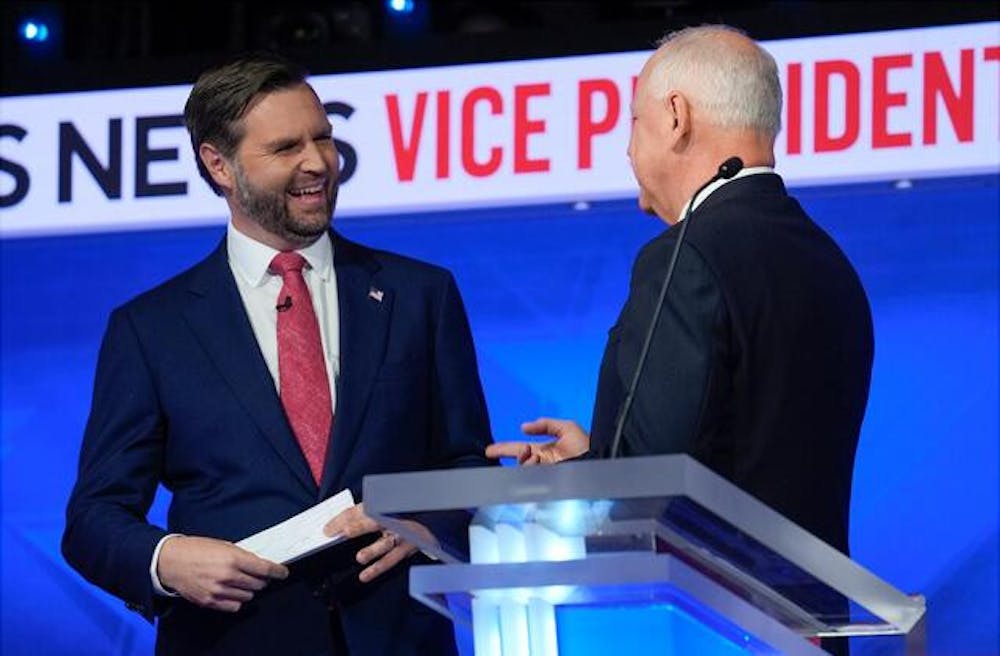On Oct. 1, Minnesota Governor Tim Walz and Ohio Senator J.D. Vance squared up for what will be the only vice presidential debate of the 2024 election season. Unlike the presidential debate, Walz and Vance began the night with a mutual handshake before taking their places behind their respective podiums.
The big focus of the night was on five main issues: the growing conflicts in the Middle East, climate change, the economy, abortion and Jan. 6.
The first question was targeted at the growing conflict in the Middle East. Walz began by referencing the events of Oct. 7..
“Israel's ability to defend itself is absolutely fundamental,” Walz stated. He also urged that it was important to end the humanitarian crisis in Gaza as well as “get hostages back.”
Walz stressed that “steady leadership” is required in order to deal with the Middle East Crisis.
Vance responded by blaming “the Kamala Harris Administration” for Iran receiving $100 billion, which allowed Iran to purchase weapons and attack America’s allies. He argued that this could possibly endanger America as well.
Vance asserted that, “it is up to Israel what they think they need to do to keep their country safe. And we should support our allies wherever they are when they are fighting the bad guys.”
Next the moderators asked the candidates to comment on Hurricane Helene and by extension, climate change.
Vance tried to strike an emotional chord by discussing how devastating the hurricane has been on its victims and offered his prayers for Florida. Vance said that a “robust and aggressive” federal response was needed to save as many people as possible.
He called the scientific consensus on carbon emissions “weird science” but stated that he and Trump are for clean energy and clean water. He called to “reshore as much American manufacturing as possible” and create more energy.
Walz also commented on the tragedy of Hurricane Helene. Walz stated that he is a co-chair on the council of governors who work together on emergency management.
He then went on to remind the audience that Vance said “there was a climate problem in the past” and that Donald Trump believes climate change was a hoax.
Walz would go on to compliment the Biden Administration on passing the “Inflation and Reduction Act.” He credited this with creating 200,000 jobs across the country.
When it came to the economy, Walz criticized Donald Trump for increasing the national debt up to eight trillion dollars.
“Now he’s proposing a 20% consumption tax on everything we bring in. Everyone agrees, including businesses that it would be destabilizing it. It would increase inflation and potentially lead to a recession,” Walz said.
Vance attacked back by blaming Kamala Harris for driving the cost of food up by 25% and raising the cost of housing up by 60%. He went on to say that under Trump there was a “rising take home pay for American workers.” According to Vance, Trump's tax cuts caused an economic boom “unlike what we have seen in a generation.”
Senator Vance was also given the opportunity to share his thoughts on why he switched from calling Trump “unfit for higher office” and “America’s Hitler” to sharing the Republican ticket with him.
After admitting to having disagreed with the president on some issues, Vance told the audience that he was wrong about Trump in 2016.
“I believed some of the media stories that turned out to be dishonest fabrications of his record”
Both Walz and Vance later had the chance to talk about the issue of abortion in America.
Despite the quote the moderators brought up, Walz denied Trump's claim that Minnesota’s laws allow an abortion in the ninth month of pregnancy.
He went on to further state the issues that different women with life threatening complications have faced in states where abortion access was taken away.
When it was Vance’s turn to talk about it, he seemed much more sympathetic than many of his Republican base probably felt comfortable with. He wanted Republicans to “earn the trust” back of the American people on this issue. He wants the Republican party to be pro-family. He and Trump both think that, given the country's diversity, leaving abortion up to the states is the best option.
Both Vance and Walz were in agreement that deregulation should play a part in helping solve the housing crisis. They both, however, disagreed on what was causing the housing issue with Walz blaming people viewing housing as a commodity and Vance blaming immigration.
At the end of the debate, Walz questioned Vance on whether Trump lost the election. Vance didn’t respond to the question and began talking about Kamala Harris’s supposed censorship during covid.
During the debate, both Walz and Vance definitely displayed a “Veil of Midwestern niceness.” They both had points they agreed on and some things they disagreed on. It was a breath of fresh air compared to the previous debate with their running mates.
Ian Janke is a junior who is getting his bachelors in History and Minor in English. In his free time he enjoys running and classical literature.





